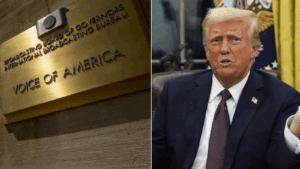U.S. Ambassador Ronald Johnson, appointed during Trump's presidency, developed a close relationship with El Salvador's President Bukele, which has drawn scrutiny for seemingly contradicting U.S. strategies against local gangs.
Closeness of U.S. Ambassador to El Salvador Sparks Controversy

Closeness of U.S. Ambassador to El Salvador Sparks Controversy
Ronald Johnson's strong ties to Salvadoran President Nayib Bukele raise concerns among U.S. officials about alignment with American interests.
Soon after his appointment as U.S. Ambassador to El Salvador, Ronald Johnson established a notably close relationship with President Nayib Bukele, which raised eyebrows among U.S. officials. Johnson was nominated by President Trump in 2019, shortly after the administration intensified efforts against violent gangs like MS-13 in the country.
The affinity between Johnson and Bukele became evident as they frequently shared family photos and posts on social media that highlighted their personal friendship. However, the relationship began to prompt concern among some officials, particularly in light of allegations against Bukele in 2020 regarding his collaboration with local gangs. Johnson publicly defended Bukele, dismissing concerns raised by U.S. Republican congressmen regarding the president's alleged ties to crime.
Questions surrounding Johnson's commitment to U.S. objectives increased when a staff member from the U.S. Embassy, who was investigating the government's potential connections to these gangs, was unexpectedly sent home. According to several current and former U.S. officials who interacted with Johnson directly, his actions appeared focused more on safeguarding the Salvadoran leader than on combating the crime syndicates that threaten both El Salvador and the United States.























